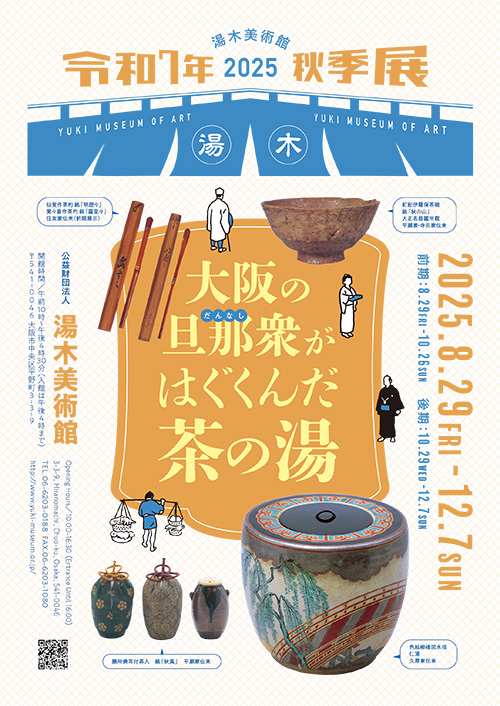

Special Exhibition:Autumn Exhibition “The tea ceremony cultivated by ”Danna-shi” the gentlemen of Semba,Osaka”
Organizing:Yuki Museum of Art
Venue:Yuki Museum of Art
Nearest Station:5-minute walk from Osaka Metro Midosuji Line “Yodoyabashi” Station Exit 11, 8-minute walk from Keihan Main Line “Yodoyabashi” Station Exit 8
Date:2025-08-29(Fri)~2025-12-07(Sun)
*First semester:8/29(Fri)~10/26(Sun)、Second semester:10/29(Wed)~12/7(Sun)
Opening time:10:00~16:30(Last admission at 4:00PM.)
Closed:Monday(Except for 9/15、10/13、11/3、11/24)、9/16、10/14、10/28、11/4、11/25
Admission fee:General 700 yen, College student 400 yen, High school student 300 yen
Contact Information:TEL 06-6203-0188
URL:http://www.yuki-museum.or.jp/exhibition/index.html
Tickets:Please pay at the Yuki Museum of Art reception desk (cash only).
More Information:Osaka during the Edo period was widely known as the “Kitchen of the Nation,” flourishing as a major hub for logistics and economy. Following the Meiji Restoration, it achieved great prosperity amid modernization and was called “Greater Osaka” in the early Showa era. By 1970 (Showa 45), during the period of high economic growth, it even hosted the World Expo.
Against this backdrop of rich and vibrant economic activity, wealthy patrons known as the “danna-shi” emerged, investing their private fortunes to support culture. While collecting antique artworks and tea utensils, the danna-shi also played an active role in cultural practice: they provided assistance and guidance to artisans, and hosted numerous tea gatherings. Osaka’s tea ceremony culture was centered around these cultured danna-shi.
This exhibition features pieces with ties to Osaka, including the “Red Tea Bowl, Inscription ‘Fukujusō’, by Sōnyū” from the Kōnoikeya Yamanaka family collection; the “Nail-Carved Irabo Tea Bowl, Inscription ‘Autumn Mountains’”, from the Hirase and Terada family collections; and the “Tea Scoop by Sensō, Inscription ‘Meireki-reki’; Tea Scoop by Kakukōsai, Inscription ‘Rōdōdō’” (exhibited in the first half), passed down by the Sumitomo family. Approximately 40 pieces will be displayed, primarily featuring tea utensils inherited by wealthy merchant families.